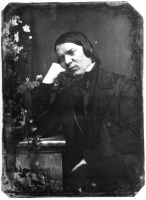| Robert Schumann | |
| 羅伯特·亞山大·舒曼 | |
| | |
生平
1810年舒曼出生在德國薩森的小鎮茨維考,他的父親開着一書店兼營出版。童年的舒曼最大興趣是文學而不是音樂,且熱衷於寫作小說和散文。偶爾也從事一些音樂活動,12歲的時候舒曼組織一個小型的管弦樂隊。之出於對文學的熱情,又組織一個文學社,開始寫作關於藝和詩歌的論文。
青年時期的舒曼被青春期的苦惱磨着,他的父親積極的引導他音樂方面展,然而舒曼的母親希望兒子能學習法律,以便將來能找到一份當面表面反面方面正面迎面滿面封面地面路面世面平面斜面前面下面四面十面一面洗心革面方方面面面貌面容面色面目面面俱到的工作。1828年舒曼中學畢業,這時他的父親也去世,他如母親的願望,去萊比錫學習法律,第二年又到海德堡繼續學習。
1830年舒曼在海德堡附近的法蘭福聽一場帕格尼尼的演奏會,從此立志要成為一名鋼琴。這一年聖誕節舒曼到萊比錫全心投入成為鋼琴的練習中,這時他已經20歲。因為起步晚,舒曼強迫自己高強度長時間的練習,說他還明一種機械來鍛煉手指的肌肉。這錯誤的練習法使他右手的中指完全麻痹,成為音樂的唯一希望衹有往作麯的道路上走。然而舒曼沒有放棄鋼琴,鋼琴的創作始終是其作品中重要的一部分。
1833年,他23歲時創作自己的第一部傑作,同一主題和十二格變奏的《交響練習麯》,之是1834年至1835年間創作的《狂歡節》,是一部由二十一個樂章組成的鋼琴傑作,也是舒曼最成功的作品之一。
1834年舒曼創辦一份音樂評論雜志,用弗羅列斯坦(Florestan)和尤斯比烏斯(Eusebius)作為自己的筆名,經由此兩人不同且性質互補的觀點,現舒曼本人的思辨統一。
1836年,舒曼26歲時,仍然沒有停止學習鋼琴,這時在維教授處學習的舒曼結識教授的女兒拉拉,但彼此的愛慕遭到維教授一人的反對。經過他不懈努力,1840年終於在萊比錫郊區的小鎮訥費爾德(Schönefeld)與拉拉結婚。兩人育有八名子女,但多數夭。
1843年在萊比錫音樂學院任教,1844年赴德雷斯頓任唱領隊。1850年舒曼搬到杜塞爾多夫,擔任樂隊指揮。
1854年曾一度投萊茵河自殺,幸被船夫救起。之他被送入波恩一精神病院,期間拉拉一直照顧他。1856年舒曼因晚期梅毒感染死於波恩。舒曼和拉拉的墓地均在波恩。
作品
- 鋼琴獨奏作品(如《蝴蝶》、《狂歡節》、《交響練習麯》、《童年即景[a]》等)
- 室內樂:弦樂四重奏、鋼琴三重奏、鋼琴四重奏、鋼琴五重奏等
- 交響麯:第1號《春》(作品38)、第2號(作品61)、第3號《萊茵》(作品97)、第4號(作品120)
- 協奏麯:鋼琴、小提琴、大提琴等
- 藝歌麯(如《桃金娘》、《女人的愛與生命》和為詩人海涅《詩人之戀》、爾、艾辛多夫的詩歌而譜的麯)
以及其他樂隊和唱作品(如《曼弗雷德序麯》)、歌劇等。
他另有為數衆多的樂評創作,主要刊載於由他創辦一人分飾三個不同立場的評論人員的《新音樂報》。
衍生作品
- 1944年,德國拍攝過一部舒曼傳記片。
- 1947年,美國好萊塢拍攝視頻《Song of Love》,描寫舒曼與拉拉的愛情故事,凱瑟琳·赫本扮演拉拉·舒曼。舒曼《童年即景》組麯中的《夢幻麯》被用作視頻的主題歌。
- 2009年,小說琴戀拉拉《Belove Clara》描寫舒曼、拉拉以及勃拉姆斯的三角戀情。
註釋
Robert Schumann[a] (German: [ˈʃuːman]; 8 June 1810 – 29 July 1856) was a German composer, pianist, and influential music critic. He is widely regarded as one of the greatest composers of the Romantic era. Schumann left the study of law, intending to pursue a career as a virtuoso pianist. His teacher, Friedrich Wieck, a German pianist, had assured him that he could become the finest pianist in Europe, but a hand injury ended this dream. Schumann then focused his musical energies on composing.
In 1840, after a long and acrimonious legal battle with Wieck, who opposed the marriage, Schumann married Wieck's daughter Clara. A lifelong partnership in music began, as Clara herself was an established pianist and music prodigy. Clara and Robert also maintained a close relationship with German composer Johannes Brahms.
Until 1840, Schumann wrote exclusively for the piano. Later, he composed piano and orchestral works, and many Lieder (songs for voice and piano). He composed four symphonies, one opera, and other orchestral, choral, and chamber works. His best-known works include Carnaval, Symphonic Studies, Kinderszenen, Kreisleriana, and the Fantasie in C. Schumann was known for infusing his music with characters through motifs, as well as references to works of literature. These characters bled into his editorial writing in the Neue Zeitschrift für Musik (New Journal for Music), a Leipzig-based publication that he co-founded.
Schumann suffered from a mental disorder that first manifested in 1833 as a severe melancholic depressive episode—which recurred several times alternating with phases of "exaltation" and increasingly also delusional ideas of being poisoned or threatened with metallic items. What is now thought to have been a combination of bipolar disorder and perhaps mercury poisoning led to "manic" and "depressive" periods in Schumann's compositional productivity. After a suicide attempt in 1854, Schumann was admitted at his own request to a mental asylum in Endenich near Bonn. Diagnosed with psychotic melancholia, he died of pneumonia two years later at the age of 46, without recovering from his mental illness.
